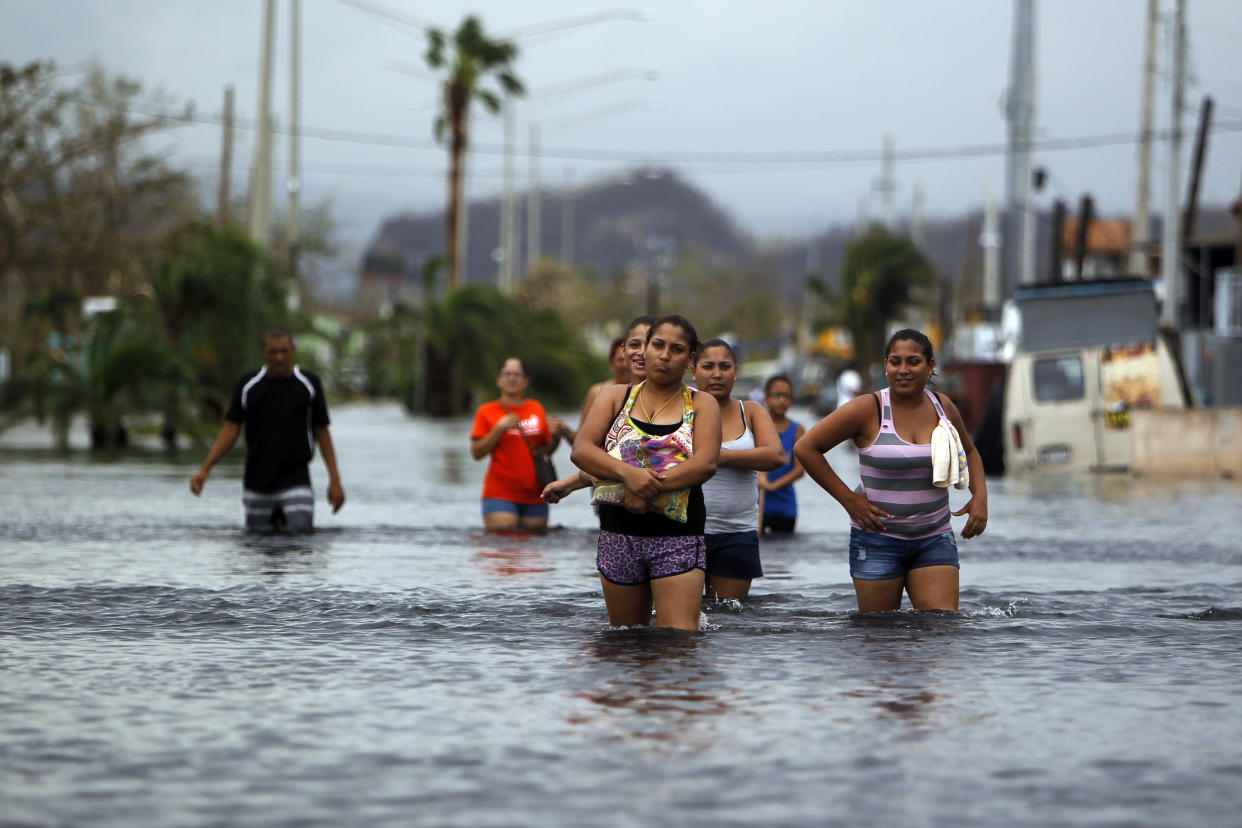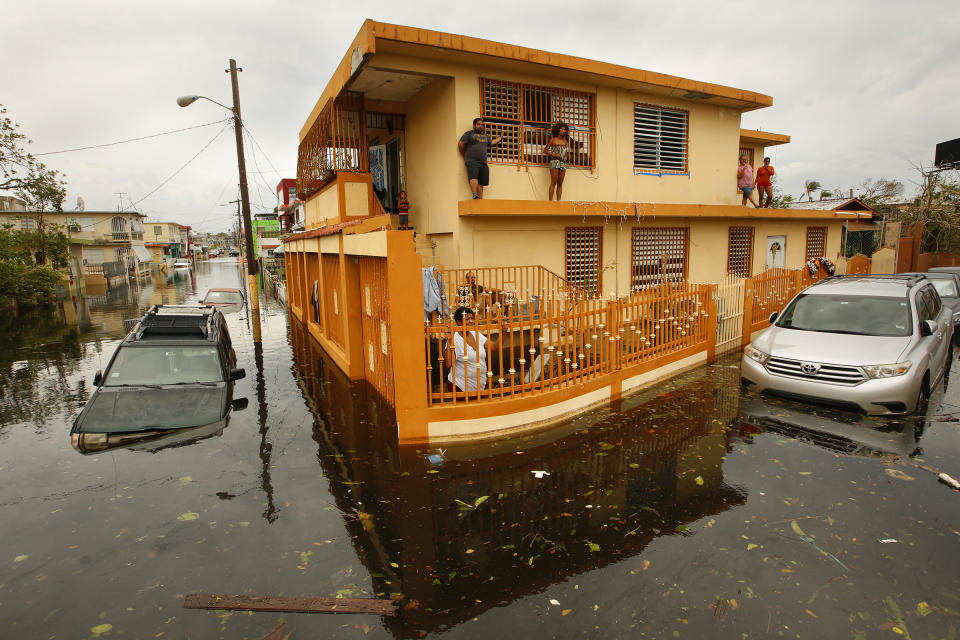Hurricane Maria coverage revives old questions about Puerto Rico's status

The U.S. media coverage of Hurricane Maria — the most devastating hurricane to strike Puerto Rico in nearly a century — sparked lively conversations about the relationship between the island commonwealth and the mainland United States.
As of Tuesday the roughly 3.4 million Puerto Ricans are struggling with basic needs, notably electricity. About 80 percent of its power lines are down, according to the island’s electricity utility.
On Tuesday morning, Susanne Ramirez de Arellano, the former news director for Univision in Puerto Rico, wrote an op-ed in the Guardian saying that Puerto Ricans embraced social media for information about the destruction because they could not trust major media outlets in the U.S. to provide in-depth coverage.
Related slideshow: Puerto Rico after Hurricane Maria >>>
“Sadly — we were proven right. The destruction in Puerto Rico received relatively little media attention compared to Hurricanes Harvey and Irma,” de Arellano wrote. “Traditional broadcasters deployed a meager team of reporters. Even the Hispanic broadcasters on the mainland proved wanting in their coverage.”
According to Ramirez de Arellano, Puerto Ricans figured that their disasters “just don’t rate high enough in [the media’s] eyes.”
Brock Long, the administrator of the Federal Emergency Management Agency (FEMA), also accused the media of falling short in its coverage — prompting the following response from CNN national correspondent Ed Lavandera Tuesday morning.
Except there are hundreds of reporters working in #PuertoRico, including a large CNN team. But don't let facts get in the way of a good jab. https://t.co/0FpAqp8n8o
— ed lavandera (@edlavaCNN) September 26, 2017
Yahoo News reached out to Indira Lakshmanan, the Newmark Chair for Journalism Ethics at the Poynter Institute, for her take on this allegation that the news media has not been covering Hurricane Maria.
“Most important, it’s not true that there hasn’t been coverage. The Weather Channel coverage has been constant, and CNN, Telemundo and Univision have been there all along,” Lakshmanan said. “The Washington Post and the New York Times and others have been there and produced amazing journalism.”
Additionally, Lakshmanan said, there are three other important things to keep in mind: the logistics of covering Puerto Rico, the sheer number of consequential stories right now and politics in Washington distracting from the island.
“The logistics of getting there if you’re not based there is hard and communications are in terrible shape, both for the victims of the storm and those trying to cover it,” Lakshmanan said. “The logistical and financial challenges of covering a disaster when you need to charter boats, planes and satellite equipment make it very hard for news organizations with limited resources.”

She pointed out that the disaster comes on the heels of Hurricanes Harvey and Irma, amid a potential nuclear standoff with North Korea, the fight over health care in Congress, daily investigative reporting on Robert Mueller’s investigation into Russian meddling, and other activities of the Trump administration, including the use of private planes at taxpayer expense by Health and Human Services Secretary Tom Price. Simply put: “There is a lot of news to cover.”
Another important factor is that President Trump has focused attention on the protests of NFL players over the unequal treatment of African-Americans at the hands of police.
Trump didn’t tweet about the hurricane until Monday, even though it made landfall last Wednesday.
He even appeared to blame Puerto Rico for its current plight. He claimed that Texas and Florida are already doing well but that the Caribbean island is in “deep trouble” because of the financial woes that predated the hurricane. Puerto Rico has been dealing with one of the worst economic crises in its modern history.
Texas & Florida are doing great but Puerto Rico, which was already suffering from broken infrastructure & massive debt, is in deep trouble..
— Donald J. Trump (@realDonaldTrump) September 26, 2017
…It's old electrical grid, which was in terrible shape, was devastated. Much of the Island was destroyed, with billions of dollars….
— Donald J. Trump (@realDonaldTrump) September 26, 2017
…owed to Wall Street and the banks which, sadly, must be dealt with. Food, water and medical are top priorities – and doing well. #FEMA
— Donald J. Trump (@realDonaldTrump) September 26, 2017
White House press secretary Sarah Sanders said Trump sent FEMA administrator Long and Homeland Security Adviser Tom Bossert to Puerto Rico to assess the damage on Monday.
“We’ve done unprecedented movement in terms of federal funding to provide for the people of Puerto Rico and others that have been impacted [by] these storms. We’ll continue to do so,” Sanders said.
On Tuesday, the Trump administration announced that he authorized an increase in the level of federal funding for “debris removal and emergency protective measures” in Puerto Rico for 180 days.
Former Democratic presidential candidate Hillary Clinton criticized Trump during a Monday interview carried on satellite radio for focusing more attention on professional football players kneeling during the national anthem than the “desperate condition” of Puerto Ricans.
“He has not said one word about them, about other American citizens in the U.S. Virgin Islands. I’m not sure he knows that Puerto Ricans are American citizens,” Clinton said at a SiriusXM town hall.

If he doesn’t, Trump is not alone. An Economist/YouGov poll last year found that only 43 percent of respondents knew that Puerto Ricans are U.S. citizens, while 41 percent of respondents did not think so and 15 percent were not sure. A new Morning Consult poll, first reported by the New York Times, estimated that 47 percent of Americans do not know that Puerto Ricans are U.S. citizens, while 54 percent do.
The history binding that island to the American mainland dates back to General Nelson Miles leading the U.S. invasion of Puerto Rico near Guanica Bay on July 25, 1898, during the Spanish-American War. About two decades later, March 2, 1917, President Woodrow Wilson signed the Jones-Shafroth Act, which granted U.S. citizenship to anyone born in Puerto Rico after April 25, 1898.
Related slideshow: Hurricane Maria barrels into the Caribbean >>>
Puerto Ricans have been U.S. citizens ever since. They carry a U.S. passport, can travel freely to all 50 U.S. states and can vote in those states if they establish residency.
Any confusion over citizenship among the public likely stems from the debate over Puerto Rico’s status, which divides into roughly three camps: support for statehood, favoring independence or remaining an unincorporated territory.
Awareness among Americans that Puerto Ricans are U.S. citizens is consequential. It can change whether their fellow citizens view their struggles — whether related to finance or natural disasters — as a foreign or a domestic matter.
_____
Read more from Yahoo News:
Clinton agrees with interviewer that authenticity is a ‘bulls*** concept’
Roger Stone: Manafort’s mood ‘amazingly good’ despite coming indictment
Locals take on China’s invasion of Africa’s biggest economy: ‘They’re like Goliath, we’re David’
Photos: Health care bill protesters descend on Senate hearing


